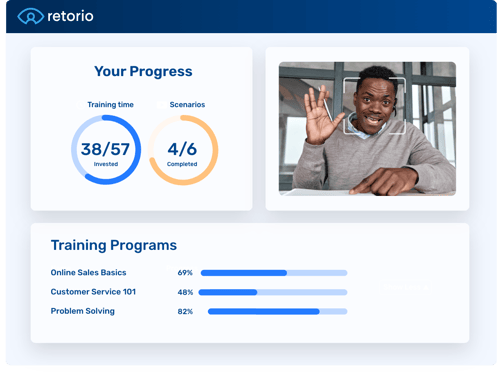With as much as half of a company’s value creation resting with the sales force, it's no wonder that sales skills training is top of mind for L&D managers today.
However, as the sales landscape continues to be unpredictable, establishing a systematic approach to sales skills training has become much harder.
Despite the fact that successful sales coaching programs increased average deal size, sales activity, win rates, and new leads by 25%-40%, most L&D managers still aren't applying a sales-specific approach to sales skills training, and thus, sales teams are missing out on growing their full potential.
In this article, we give you the full rundown of what soft skills training is, and how you can level up your sales teams skills in the
What's In This Post?
- What are the top sales skills training topics?
- What should sales training include?
- Soft skills training for employees
- Soft skills training for managers
What are the top sales skills training topics?
Interest in sales skills training has grown tremendously. As the global economy has become more competitive, companies have recognized that investing in sales skills training is no longer an option, but a necessity. But what are the top sales skills training topics to prioritize?

1. Pipeline management
A well-managed pipeline ensures that sales reps are focused on the right prospects, at the right time, with the right message. This enables reps to identify and pursue the most promising opportunities while avoiding wasted effort on prospects that are unlikely to convert.
By understanding where each prospect is in the sales process, reps can tailor their approach and messaging accordingly. This can help build stronger relationships with prospects and increase the likelihood of closing deals.
2. Identifying customer needs
LinkedIn's study based on surveys of more than 7,500 buyers and sellers around the globe found that 43% of buyers find it's an "immediate deal breaker" when sellers don't understand their company and its needs.
Identifying customer needs is a critical sales skill that can make or break a salesperson's success in today's competitive business landscape. By understanding the unique needs and pain points of their customers, salespeople can develop targeted solutions that address their customers' specific challenges, building stronger relationships and ultimately driving revenue growth.
One of the key benefits of mastering the skill of identifying customer needs is the ability to develop tailored sales pitches that resonate with customers. By taking the time to understand their customers' needs and pain points, salespeople can develop targeted messaging that speaks directly to those concerns, making it more likely that customers will be receptive to their message and ultimately more likely to make a purchase.

3. Managing objections
"It's too expensive", "I've never heard of your company", I don't see how this can help me", "It isn't important for me right now."
Objections are a natural part of the sales process, but that doesn't mean it always gets easier. But it can be the make or break of building strong relationships between sales reps and clients.
Managing objections is one of the most critical sales skills that salespeople need to master to succeed in the highly competitive business environment of today - it helps salespeople navigate the often-challenging sales process, overcome customer resistance, and ultimately close more deals.
One of the most significant benefits of mastering the skill of managing objections is the ability to build stronger relationships with customers. By effectively addressing customer concerns and objections, salespeople can demonstrate their expertise, build trust, and establish credibility. This, in turn, can help to foster more open and productive relationships, leading to more sales in the future.
| Skill Category | Description | Example Skills | Relevance for L&D |
|---|---|---|---|
| Foundational Skills | Essential building blocks for any sales role. | Communication, Active Listening, Product Knowledge, Time Management, Organization | Crucial for onboarding new hires and establishing a strong base. |
| Prospecting & Lead Gen | Skills to identify and qualify potential customers. | Lead Generation Techniques, Social Selling, Networking, Database Management, Research | Vital for pipeline development and ensuring a consistent flow of opportunities. |
| Customer Interaction | Skills for engaging with customers and building relationships. | Building Rapport, Needs Analysis, Questioning Techniques, Presentation Skills, Storytelling | Directly impacts customer experience and the ability to understand needs. |
| Sales Process & Strategy | Skills to navigate the sales cycle effectively. | Sales Methodologies (e.g., Solution Selling, Consultative Selling), Pipeline Management, Sales Planning, Territory Management | Ensures a structured approach to sales and efficient resource allocation. |
| Advanced Sales Techniques | Skills for closing deals and maximizing revenue. | Negotiation, Objection Handling, Closing Techniques, Upselling & Cross-selling, Account Management | Drives revenue growth and increases deal value. |
| Technology & Tools | Skills to leverage technology for sales efficiency. | CRM Utilization, Sales Automation Tools, Data Analysis for Sales, Virtual Selling | Enhances productivity and provides data-driven insights for improvement. |

What should sales training include?
Despite sales skills training budgets increasing every year, 45% of companies only cover two to five training topics with their sales professionals. A good sales skills training is one that includes a variety of topics and skills that help salespeople succeed in their roles, engage learners, and motivate them.
Retorio's AI Coaching platform is a video-powered training platform helping L&D managers around the globe develop the talent they need to excel at sales growth. Retorio's sales skills training includes:
- AI-video-powered training modules where sales trainees can practice real-life client scenarios
- Tailored feedback for sales trainees on their performance
- Suggestions for further sales skills training modules based on results
- Personalized learning paths for sales reps
| Training Method | Format & Description | Key Benefits for L&D | Considerations for L&D |
|---|---|---|---|
| In-Person Workshops | Interactive, group-based sessions with instructor-led training. | High engagement, immediate feedback, collaborative learning, strong networking. | Higher cost, scheduling challenges, geographical limitations. |
| Online Courses (e-Learning) | Self-paced digital modules, videos, and assessments. | Scalable, cost-effective, flexible access, trackable progress. | Requires self-discipline, can lack personal interaction, engagement can vary. |
| Blended Learning | Combines online modules with in-person sessions or virtual instructor-led training. | Balances flexibility with interaction, caters to different learning styles, cost-effective. | Requires careful design to integrate online and offline components effectively. |
| On-the-Job Coaching | 1-on-1 coaching by managers or senior sales professionals, often in real-time. | Highly personalized, practical application, immediate feedback, reinforces learned skills. | Requires skilled coaches, can be time-intensive, scalability challenges. |
| Virtual Instructor-Led Training (VILT) | Live, interactive training delivered online via video conferencing. | Combines interaction with remote accessibility, cost-effective compared to in-person. | Requires strong facilitation skills, potential for technical issues, engagement management online. |
| AI-Powered Coaching Platforms | Technology-driven platforms using AI for personalized feedback, simulations, and data analytics. | Scalable personalization, objective feedback, data-driven insights, 24/7 accessibility, cost-efficient compared to 1:1 coaching. | Requires platform selection and integration, initial setup and user adoption. |
Soft skills training for employees
The way work gets done is evolving rapidly. Soft skills are the building blocks for facilitating fluid and efficient communication within a workforce. Particularly in a sales environment, where communication, relationships, and presenting your organization in a positive way to the public and potential employees is a priority, companies are recognizing more and more that soft skills are in fact irreplaceable and need to be focussed on developing.

Soft skills training for managers
Just like how soft skills are the building blocks for facilitating fluid relationships between sales reps and clients, the same goes for managers and employees.
Picture this... you have a manager who always talks over the other employees during meetings, interrupts them, and dismisses their ideas without giving them a chance to express themselves fully. They're quick to criticize and blame their employees for mistakes, rather than working collaboratively to find solutions. They don't take the time to listen to their employees' concerns or feedback and tend to be dismissive or defensive when confronted with criticism.
Soft skills are particularly important for managers who need to lead and motivate teams, resolve conflicts, and communicate effectively with people at all levels of the organization.

Want to see how companies are training their sales rep's sales skills using AI today? Check out the button below!
The Role of AI in Enhancing Sales Skills Training
Artificial Intelligence (AI) is revolutionizing sales skills training, offering powerful tools to elevate your program to the next level:
- Personalized Coaching: Tailored Learning Journeys
AI coaching provides personalized learning experiences and feedback, addressing individual needs and learning gaps. AI can adapt to each rep's pace and style, ensuring they receive the most relevant and impactful training. - Data-Driven Insights: Targeted Skill Development
AI algorithms analyze numerous behaviors, offering data-driven insights for targeted skill development. AI can pinpoint specific areas where reps need improvement based on actual performance data, leading to more effective coaching. - Consistent Training Quality: Uniform and Unbiased Instruction
AI ensures uniform training, eliminating biases and delivering high-quality instruction consistently. Every rep receives the same core training, guaranteeing a standardized level of sales proficiency across your team. - Scalability: Training Multiple Learners Simultaneously
AI coaching can train multiple learners simultaneously, making it highly scalable and cost-effective. Train your entire sales team without the logistical challenges and costs associated with traditional in-person training. - Real-time Monitoring: Precise Metrics and Actionable Feedback
AI tracks and analyzes every aspect of a learner's performance in real-time, providing precise metrics and actionable feedback. Gain granular insights into rep progress and identify areas for immediate coaching intervention. - Accessibility: Learning Anytime, Anywhere
AI-driven training can be accessed anytime, fitting into learners’ schedules without disrupting work. Provide flexible learning options that accommodate the busy schedules of your sales team.
Benefits of AI-Driven Sales Skills Training
Embracing AI in your sales skills training program unlocks a range of significant benefits:
- Improved Engagement: Interactive and personalized learning experiences enhance learner interest and participation
- Effective Skill Development: Targeted insights accelerate skill development and boost knowledge retention
- Measurable Business Outcomes: Clear, replicable metrics align training results with business goals
- Cost Savings: AI reduces the need for multiple human trainers, cutting training expenses
AI coaching offers tailored solutions for various roles within your sales organization:
- Sales Enablement: AI tools facilitate quick implementation of various training topics and demonstrate the impact on essential business skills
- Program Managers/Trainers: AI offers pre-built frameworks and customizable content, streamlining the creation and delivery process
- Sales Learners: AI coaching provides relevant, personalized feedback and a safe environment to practice and build confidence
- Commercial Directors: AI analytics deliver detailed reports on individual improvement and insights into successful sales behaviors
|
Key Area |
Benefit of Sales Skills Training |
Role of AI in Enhancing Training |
|
Revenue Impact |
Boosts revenue, achieves sales targets |
Personalized coaching to improve closing skills |
|
Competitive Edge |
Adapts to market changes, drives innovation |
Data-driven insights for targeted skill development |
|
Training Effectiveness |
Closes skill gaps, improves product knowledge, negotiation, etc. |
Consistent quality, real-time monitoring of progress |
|
Scalability & Cost |
Trains entire teams efficiently, aligns with business goals |
Scalable training for multiple learners, reduces training expenses |
|
Engagement & Learning |
Enhances participation, accelerates skill development & retention |
Interactive and personalized learning experiences |
Investing in sales skills training is a strategic imperative for any business looking to thrive. By focusing on key components, implementing a structured development process, and leveraging the power of AI, you can create a high-impact training program that empowers your sales team, drives measurable business outcomes, and secures a lasting competitive advantage.
Start building your future-proof sales force today!
Sales skills training involves equipping sales professionals with the necessary knowledge, skills, and attitudes to perform their roles effectively. It typically involves a structured approach that includes coaching, feedback, and continuous improvement over time.
The ultimate goal is to improve sales performance both in the short term and the long term, by making positive changes to the behaviors and habits of the sales team. By following a coaching playbook and engaging in regular one-on-one or group conversations, sales professionals can improve their sales skills and develop best practices that become automatic over time.
There are many different training methods to help train sales representatives and close skill gaps. From workshops and seminars to e-learning platforms to video-coaching and AI.
Luckily today, we can harness A.I. technology to make personalized learning available for sales reps that is scalable and allows sales reps globally to train their sales skills wherever they are, whenever they want.
Analytics can devise training curricula based on the trainee’s specific needs, help carve out customized learning paths for the learners, as well as give highly personalized feedback to each employee.
Sales skills training is especially valuable for beginners. Think of it as building a strong foundation. Everyone starts somewhere, and training provides you with the essential tools, techniques, and confidence to succeed right from the start. It's like learning to drive – you wouldn't get behind the wheel without some instruction, would you? Sales training gives you that initial guidance and structure.
What kind of skills will I actually learn in sales skills training for beginners? Are they difficult to grasp?
A: Beginner training focuses on the core skills you need to be effective. You'll learn things like:
- Understanding the Sales Process: Learning the stages of a sale from start to finish.
- Communication Skills: How to talk to customers clearly and persuasively.
- Active Listening: Really hearing and understanding customer needs.
- Product Knowledge Basics: Learning enough about what you sell to explain it well.
- Handling Basic Objections: Learning simple ways to respond when customers say "no" or express concerns.
- Building Relationships: Starting to connect with customers and build trust.
These skills are taught in a step-by-step way, and beginner training is designed to be easy to understand and practice. It's not about being pushy or complicated, but about learning simple, effective techniques.
Effective sales skills are crucial for driving revenue and business growth. Training improves individual salesperson performance, boosts team productivity, enhances customer relationships, and ultimately increases profitability. In today's competitive market, continuous sales skill development is essential.
* Prospecting & Lead Generation: Finding and qualifying potential customers.
* Communication & Active Listening: Building rapport and understanding customer needs.
* Presentation & Storytelling: Articulating value propositions effectively.
* Objection Handling: Addressing customer concerns and hesitations.
* Negotiation & Closing: Reaching mutually beneficial agreements and securing deals.
* Relationship Building & Customer Retention: Creating long-term customer loyalty.
* Sales Technology & Tools: Leveraging CRM and other technologies to enhance efficiency.
Your team's specific needs and skill gaps.
* The training methodology and format.
* The experience and expertise of the trainers.
* The program's content and curriculum.
* Budget and time constraints.
* Measurable outcomes and ROI.
* Reviews and testimonials from other companies.
The cost varies significantly based on the type of training, program length, provider, and number of participants. Consider the long-term ROI – investing in effective sales skills training is an investment in your company's future success. Explore options that fit your budget, from online courses to customized programs and AI-powered solutions.
You have traditional workshops, online courses, coaching... but for scalable, personalized, and data-driven results, AI coaching platforms like Retorio are leading the way. Retorio offers the flexibility of online learning with the personalization of 1-on-1 coaching, but at scale and with objective AI feedback, overcoming limitations of traditional methods.
Lasting change requires ongoing development, not just a one-off event. Retorio is designed for continuous learning. Its bite-sized simulations and on-demand feedback fit seamlessly into busy schedules, allowing for consistent practice and skill reinforcement without disrupting workflow. Plus, new hires ramp up 38% faster with AI coaching, saving valuable time.
Look for programs that are personalized, practical, measurable, and proven. Retorio checks all these boxes. It offers tailored AI coaching, focuses on real-world application, provides data-driven ROI metrics, and has demonstrated tangible results like a 7% revenue increase in 4 months for some companies. It's a forward-thinking solution for modern sales teams.




